Biology:Galeaspida
| Galeaspida | |
|---|---|
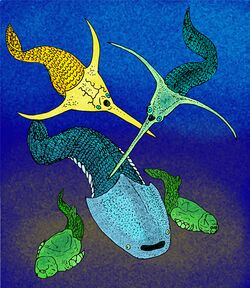
| |
| Scientific classification | |
| Kingdom: | Animalia |
| Phylum: | Chordata |
| Subphylum: | Vertebrata |
| Class: | †Galeaspida Liu, 1965 |
| Orders | |
|
Eugaleaspidiformes Liu, 1965 | |
Galeaspida (from Latin, 'Helmet shields') is an extinct taxon of jawless marine and freshwater fish. The name is derived from galea, the Latin word for helmet, and refers to their massive bone shield on the head. Galeaspida lived in shallow, fresh water and marine environments during the Silurian and Devonian times (430 to 370 million years ago) in what is now Southern China , Tibet and Vietnam. Superficially, their morphology appears more similar to that of Heterostraci than Osteostraci, there being currently no evidence that the galeaspids had paired fins.[citation needed] A galeaspid Tujiaaspis vividus from the Silurian period of China was described in 2022 as having a precursor condition to the form of paired fins seen in Osteostraci and gnathostomes.[2] Earlier than this, Galeaspida were already in fact regarded as being more closely related to Osteostraci, based on the closer similarity of the morphology of the braincase.[citation needed]
Morphology
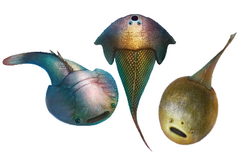

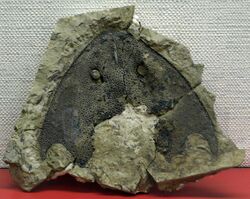
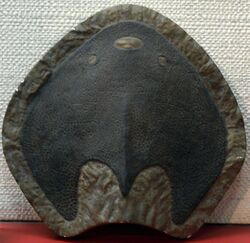
The defining characteristic of all galeaspids was a large opening on the dorsal surface of the head shield, which was connected to the pharynx and gill chamber, and a scalloped pattern of the sensory-lines.
The opening appears to have served both the olfaction and the intake of the respiratory water similar to the nasopharyngeal duct of hagfishes.[3] Galeaspids are also the vertebrates which have the largest number of gills, as some species of the order Polybranchiaspidida (literally "many gills shields") had up to 45 gill openings. The body is covered with minute scales arranged in oblique rows and there is no other fin besides the caudal fin. The mouth and gill openings are situated on the ventral side of the head, which is flat or flattened and suggests that they were bottom-dwellers.
Taxonomy
There are around 76 + described species of galeaspids in at least 53 genera.
If the families Hanyangaspidae and Xiushuiaspidae can be ignored as basal galeaspids, the rest of Galeaspida can be sorted into two main groups: the first being the order Eugaleaspidiformes, which comprises the genera Sinogaleaspis, Meishanaspis, and Anjianspis, and the family Eugaleaspididae, and the second being the Supraorder Polybranchiaspidida, which comprises the order Polybranchiaspidiformes, which is the sister taxon of the family Zhaotongaspididae and the order Huananaspidiformes, and the family Geraspididae, which is the sister taxon of Polybranchiaspidiformes + Zhaotongaspididae + Huananaspidiformes.
Some experts demote Galeaspida to the rank of subclass, and unite it with Pituriaspida and Osteostraci to form the class Monorhina.
Fossil record
The oldest known galeaspids, such as those of the genera Hanyangaspis and Dayongaspis, first appear near the start of the Telychian age, of the latter half of the Llandovery epoch of the Silurian, about 436 million years ago. During the transition from the Llandovery to the Wenlock, the Eugaleaspids underwent a diversification event. By the time the Wenlock epoch transitioned into the Ludlow Epoch, all of the eugaleaspids, save for the Eugaleaspidae, were extinct. The Eugaleaspidae lived from the Wenlock, and were fairly long-lived, especially the genus Eugaleaspis. The last of the Eugaleaspididae disappeared by the end of the Pragian Epoch of the Lower Devonian.
The first genus of Geraspididae, the eponymous Geraspis, appears during the middle of the Telychian. The other genera of Polybranchiaspidida appear in the fossil record a little after the beginning of the Lochkovian Epoch, at the start of the Devonian. The vast majority of the supraorder's genera either date from the Pragian epoch, or have their ranges end there. By the time the Emsian epoch starts, only a few genera, such as Duyunolepis and Wumengshanaspis, survive, with most others already extinct. The last galeaspid is an as yet undescribed species and genus from the Fammenian epoch of the Late Devonian, found in association with the tetrapod Sinostega and the antiarch placoderm Remigolepis, in strata from the Northern Chinese province of Ningxia.
Taxa
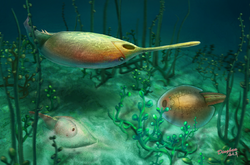
- Jiaoyu
- Family Hanyangaspididae Pan & Liu 1975
- Hanyangaspis Pan & Liu 1975
- Nanjiangaspis Wang et al. 2002
- Kalpinolepis Wang, Wang & Zhu 1996
- Konoceras Pan 1992
- Hongshanaspis
- Latirostraspis Wang, Xia & Chen 1980
- Family Xiushuiaspididae Pan & Liu 1975
- Changxingaspis Wan 1991
- Microphymaspis Wang et al. 2002
- Xiushuiaspis Pan & Wang 1983
- Xiyuaspis
- Family Dayongaspididae Pan & Zen 1985
- Dayongaspis Pan & Zen 1985
- Platycarpaspis Wang et al. 2002
- Order Eugaleaspidiformes Liu 1965
- Yongdongaspis Chen et al., 2022
- Tujiaaspis
- Family Shuyuidae Shan et al. 2020
- Meishanaspis Wang 1991
- Shuyu Gai et al. 2011
- Qingshuiaspis
- Jiangxialepis
- Family Tridenaspididae Liu 1986
- Pterogonaspis Zhu 1992
- Tridenaspis Liu 1986
- Falxcornus
- Family Sinogaleaspididae Pan & Wang 1980
- Anjiaspis Gai & Zhu 2005
- Sinogaleaspis Pan & Wang 1980
- Rumporostralis Shan et al. 2020
- Family Eugaleaspididae Liu 1980
- ?Liuaspis Whitley 1976 non Borchsenius 1960
- Dunyu Zhu et al. 2012
- Eugaleaspis Liu 1965 [Galeaspis Liu 1965 non Ivshin ex Borukaev 1955]
- Nochelaspis Zhu 1992
- Pseudoduyunaspis Wang, Wang & Zhu 1996
- Yunnanogaleaspis Pan & Wang 1980
- Xitunaspis
- Super order Polybranchiaspidida Liu 1965
- Order Polybranchiaspidiformes Janvier 1996
- Family Gumuaspididae Gai et al. 2018
- Gumuaspis Wang & Wang 1992
- Platylomaspis Gai et al. 2018
- Nanningaspis Gai et al. 2018
- Laxaspis Liu 1975
- Pseudolaxaspis
- Family Geraspididae Pan & Chen 1993
- Geraspis Pan & Chen 1993
- Kwangnanaspis Cao 1979
- Family Pentathyraspididae Pan 1992
- Pentathyraspis Pan 1992
- Microhoplonaspis Pan 1992
- Family Duyunolepididae Pan & Wang 1978a
- Duyunolepis Pan & Wang 1982
- Pseudoduyunolepis
- Paraduyunolepis Pan & Wang 1978
- Neoduyunolepis Pan & Wang 1978
- Lopadaspis Wang et al. 2002
- Foxaspis
- Family Hyperaspididae Pan 1992
- Hyperaspis Pan 1992
- Family Polybranchiaspididae Liu 1965
- Altigibbaspis Liu, Gai & Zhu 2017
- Polybranchiaspis Liu 1965
- Bannhuanaspis Janvier, Than & Phuon 1993
- Clororbis Pan & Ji 1993
- Dongfangaspis Liu 1975
- Siyingia Wang & Wang 1982
- Diandongaspis Liu 1975
- Damaspis Wang & Wang 1982
- Cyclodiscaspis Liu 1975
- Family Gumuaspididae Gai et al. 2018
- Order Huananaspidiformes Janvier 1975
- Family Sanqiaspididae Liu 1975
- Sanqiaspis Liu 1975
- Family Zhaotongaspididae Wang & Zhu 1994
- Zhaotongaspis Wang & Zhu 1994
- Wenshanaspis Zhao, Zhu & Jia 2002
- Family Sanchaspididae Pan & Wang 1981
- Sanchaspis Pan & Wanao 1981 (not to be confused with Sanqiaspis)
- Antiquisagittaspis Liu 1985
- Family Gantarostrataspididae Wang & Wang 1992
- Gantarostrataspis Wang & Wang 1992
- Wumengshanaspis Wang & Lan 1984
- Rhegmaspis Gai et al. 2015
- Qushiaspis
- Family Huananaspidae Liu 1973
- Huanaspis Liu 1973 (sister-taxon of Macrothyraspinae)
- Asiaspis Pan ex Pan, Wang & Liu 1975
- Nanpanaspis Liu 1965
- Stephaspis Gai & Zhu 2007
- Subfamily Macrothyraspinae
- Macrothyraspis Pan 1992
- Lungmenshanaspis Pan & Wang 1975
- Qingmenaspis Pan & Wang 1981
- Sinoszechuanaspis Pan & Wang 1975
- Family Sanqiaspididae Liu 1975
- Order Polybranchiaspidiformes Janvier 1996
See also
References
- ↑ Sansom, Robert S.; Randle, Emma; Donoghue, Philip C. J. (February 7, 2015). "Discriminating signal from noise in the fossil record of early vertebrates reveals cryptic evolutionary history". Proceedings of the Royal Society B 282 (1800): 20142245. doi:10.1098/rspb.2014.2245. PMID 25520359.
- ↑ Gai, Zhikun; Li, Qiang; Ferrón, Humberto G.; Keating, Joseph N.; Wang, Junqing; Donoghue, Philip C. J.; Zhu, Min (2022-09-29). "Galeaspid anatomy and the origin of vertebrate paired appendages" (in en). Nature 609 (7929): 959–963. doi:10.1038/s41586-022-04897-6. ISSN 0028-0836. https://www.nature.com/articles/s41586-022-04897-6.
- ↑ Fossil jawless fish from China foreshadows early jawed vertebrate anatomy The galeaspids are characterized by a large median dorsal opening in the anterior part of the headshield that serves as both a common nostril and the main water intake device.
- Pan Jiang, "New Galeaspids (Agnatha) From the Silurian and Devonian of China In English" 1992, ISBN 7-116-01025-4
- Janvier, Philippe. Early Vertebrates Oxford, New York: Oxford University Press, 1998. ISBN 0-19-854047-7
- Long, John A. The Rise of Fishes: 500 Million Years of Evolution Baltimore: The Johns Hopkins University Press, 1996. ISBN 0-8018-5438-5
- Zhu Min, Gai Zhikun. "Phylogenetic relationships of Galeaspids (Agnatha)" 2007 :Higher Education Press and Springer-Verlag 2007
- Nelson, Joseph S.; Terry C. Grande; Mark V. H. Wilson (2016). Fishes of the World (5th ed.). John Wiley & Sons. ISBN 9781118342336.
- "Fish classification 2017". http://mayatan.web.fc2.com/bunrui.htm.
External links
Wikidata ☰ Q134311 entry
 |
